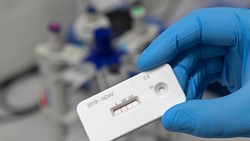According to the Centers for Disease Control and Prevention (CDC), blood tests can determine past infections of a virus by detecting antibodies, proteins created by the immune system in response to a virus that protects against later infections. However, there have been questions as to how accurate COVID-19 antibody tests are for detecting past infections, according to an article published by the CDC’s November edition of the Morbidity and Mortality Weekly Report (MMWR).
Antibodies within patients decline over time. According to the CDC article, a negative antibody test does not indicate that a patient did not have a previous infection of COVID-19. Because the amount of time COVID-19 antibodies remain detectable within a patient’s blood remains uncertain, health experts believe that this blood test does not seem like a reliable way of detecting a past infection.
The CDC article presented a group of over 3,000 United States healthcare workers who underwent a study conducted by a group of academic medical centers, known as The Influenza Vaccine Effectiveness in the Critically Ill (IVY) Network. Each medical personnel in the study took a blood test in April 2020 to show their original COVID-19 antibody count. After 60 days, the healthcare workers were required to return and have another blood test within the study.
156 healthcare workers returned out of the original group for their second blood test appointment. Out of this sample, 93.6 percent showed a decline in their antibody count compared to their initial visit 60 days prior. Of the 156 people, 28.2 percent reported that their antibody count was just below the level of detection for their second antibody test, which would show as a negative antibody result.
The findings in this study had some limitations that could have influenced its results. Approximately 20 percent of the sample did not return for a secondary blood test.
The study also stated that 13 United States medical facilities were used to gather healthcare participants. By obtaining a sample size from one particular setting, the findings are convenient but can be unnatural compared to obtaining random samples of participants. Some of the samples in this study could have also been misdiagnosed due to still having some antibodies, yet not enough to be detected within a blood test.
Healthcare workers showing a decline in their antibody results when working in infected settings every day questions the accuracy of detecting past COVID-19 infections through the blood test. An antibody test may or may not show if someone has had a past COVID-19 infection, according to the findings of the study.
The antibody test only tests for antibodies in the blood. Since the healthcare workers in this study had a decline in antibodies but did not show signs of further COVID-19 infection while they continued working, this shows that they had immunity to the virus.
The antibody test should not be used as a sole detector of a current or past COVID-19 infection. It should be used to determine if someone has antibodies against COVID-19. It takes time for antibodies to build up after a potential infection as well.
Although the amount of time COVID-19 antibodies can be detected in a patient’s blood is still uncertain, healthcare personnel believe that antibody testing is necessary to combatting the virus.
“Antibody testing is vital to helping understand this virus and the actual prevalence,” said health promotion student Savannah Steinhauer. “Those infected may not have tested or even believed they had it due to being asymptomatic, or due to an incorrect diagnosis. Antibody testing aids epidemiologists and other public health officials with establishing a more comprehensive analysis of those who have been infected and the accurate disease prevalence of COVID-19. It also adds a peace of mind to those who find out that they either did have the virus, or did not.”
Steinhauer continued, “Personally, I would like to get an antibody test just to see what my results are; maybe I did have the virus at one point and didn’t know. I think if people treated the antibody testing the same as the blood test for the mono virus, then public health officials and patients would have a better understanding of their bodies, care, and whether or not they’re susceptible.”
IMAGE TAKEN from ABC News



